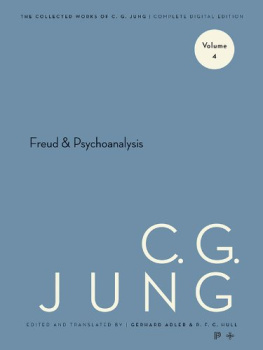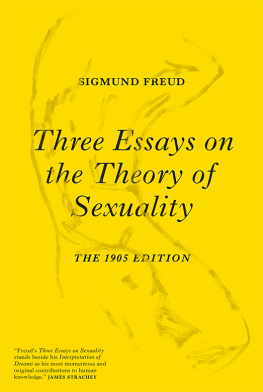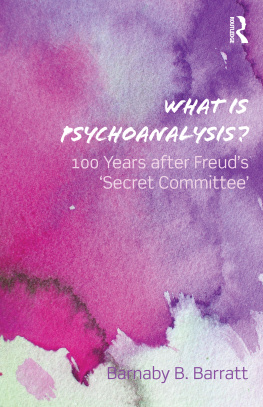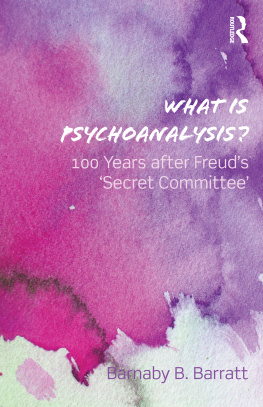The Parting
of the Ways
How Esoteric Judaism
and Christianity Influenced
the Psychoanalytic Theories
of Sigmund Freud
and Carl Jung
The P SYCHOANALYSIS AND J EWISH L IFE book series has been established to promote scholarship, research, and a wide range of theoretical, textural, and clinical studies on the multiple interconnections between and mutual influence of Judaism and contemporary psychoanalysis. Its aim is broad, spanning a wide variety of subject areas: from the origins of psychoanalysis in Jewish circles in turn-of-the-century Vienna to clinical studies illuminating contemporary facets of Jewish identity and self-understanding; from explorations of psychological aspects of Jewish theology to psychoanalytic investigations of anti-Semitism; from studies of Jewish religious ritual to analyses of Hasidic mysticism and folklore; from psychoanalytic studies of pre-World War II Yiddish theater to the clinical practice of psychoanalysis in modern-day Tel Aviv. The Psychoanalysis and Jewish Life book series provides a home for fresh and intellectually challenging contributions across the spectrum of this interdisciplinary area of scholarship.
S ERIES E DITOR
Lewis Aron, PhD (New York University, New York)
E DITORIAL B OARD
Susannah Heschel, PhD (Dartmouth College, Hanover)
Arnold Richards, MD (New York University, New York)
Moshe Halevi Spero, PhD (Bar-Ilan University, Ramat Gan),
Karen Starr, PsyD (Long Island University at C. W. Post, Brookville, New York)
The Parting
of the Ways
How Esoteric Judaism
and Christianity Influenced
the Psychoanalytic Theories
of Sigmund Freud
and Carl Jung
RICHARD
KRADIN
Boston
2016
Library of Congress Cataloging-in-Publication Data:
A catalog record for this title is available
from the Library of Congress.
Copyright 2016 Academic Studies Press
All rights reserved
ISBN 978-1-61811-422-8 (cloth)
ISBN 978-1-61811-423-5 (electronic)
On the cover: Prima facie, by Siobhan Cashman.
Published by Academic Studies Press in 2016
28 Montfern Avenue
Brighton, MA 02135, USA
www.academicstudiespress.com
Table of Contents
Acknowledgements
T his book is the culmination of my years of training in both psychoanalysis and religion. I wish to thank all of my teachers of Freudian and Jungian psychoanalysis, especially Robert Bosnak and the late Ann Alonso for their interest in my ideas during training and beyond. I wish to acknowledge my Harvard University thesis advisor Paul Hanson for his help in integrating ideas from early Judaic and Christian history. I acknowledge my heartfelt appreciation for Rev. Michael Domba, zl, who taught me how to approach a Talmudic text. My thanks to R. Nehemiah Polen, R. Ebn Leader, Barry Mesch, and R. Arthur Green of Hebrew College for their teachings and wisdom. My appreciation is extended to my various teachers in the Chabad Hasidic movement, Rabbis Yossel Polter, Shmuel Posner, Yosef Zaklos, and Yosef Goldberg, who live the lives that some of us merely write about. My thanks extend to my editor, Lew Aron, for giving me the opportunity to author this text and sufficient license to express some controversial ideas. And of course to family and friendsyou know how I feel about you. Shalom /Peace.
Preface
L ike Sigmund Freud and Carl Jung, I am a physician. I chose to pursue my interests in psychoanalysis after having first established a career as both a pulmonologist and pathologist at the Massachusetts General Hospital (MGH), where I continue to practice in all of these areas. I trained in Freudian psychoanalytical psychotherapy at the Boston Institute of Psychotherapies and at the MGH, and served in the MGH Psychopharmacology Clinic where I gained a firm footing in biological psychiatry. I subsequently trained at the C. G. Jung Institute in Boston and received my diploma as a Jungian analyst.
However, I found myself often at odds with my Jungian colleagues. Some had little or no background in clinical psychology or psychiatry, and had received a classical Jungian training in Zurich. Their mode of analysis was focused on dream interpretation and active imagination, which, although fascinating, was in my opinion questionably effective in dealing with the neurotic problems of many patients. Many of my Jungian colleagues expressed little interest in developmental psychopathology, and there appeared to be few mutually agreed upon rules concerning how to conduct the treatment of patients, and a notable resistance towards instituting any.
This was antithetical to my Freudian training. If anything, I had found my Freudian colleagues overly focused on maintaining boundaries and on the analysis of Oedipal issues. Their approach to patients at times seemed formulaic and constrained. I began to suspect that the differences between my Freudian and Jungian approaches had identifiable roots in the tenets of Judaism and Christianity.
I was born into a family of first-generation American Jews and raised in a secular home, but one with strong ties to observant Judaism. My parents were not strictly kosher, although my mother only purchased meat from a kosher butcher, and the idea of mixing meat with dairy at the dinner table was anathema. Unleavened foodstuff ( chametz ) was inadmissible to our house during Passover, yet we celebrated no family Seder. The major religious holidays of Sukkot and Shavuot were ignored, yet our home assumed an aura of scrupulous religiosity during the High Holy Days. We did not observe the Sabbath. In retrospect, I cannot explain why certain tenets of Judaism were firmly held while others were ignored by my family, except to say that the desire to assimilate into American culture and the atrocities of World War II had left traditional Judaism in disarray and in search of new directions.
I was educated in the Conservative synagogue, and taught to read Hebrew, but with little understanding of what I was reading. Like many of my peers, I did not adhere to my religion after my Bar Mitzvah, but neither did I abandon it. When my mother died in 1983, I began to say kaddish , the traditional prayer for the dead, and attended the synagogue service twice each day for eleven months. I read voraciously about Judaism but frankly found its legalisms arid. When I asked my teacher, Rev. Michael Domba, a survivor of the Holocaust who had been a student at the Slobodka yeshiva in Lithuania before the war, whether it would be possible to study the Kabbalah, the mystical writings and practices of Judaism, his answer was that it was an area best avoided. I was curious about his reply, and as to why Judaism needed to be limited to Talmudic study and ritual observance.
According to family lore, we were related to the Gaon of Vilna, the great Lithuanian scholar who had opposed the burgeoning Hasidic movement in the eighteenth century. As a physician and medical scientist, I had little inclination to associate with a sect whose members dressed like they were still living in the eighteenth century and who lived in a world apart from others. However, one day I decided to attend a Sabbath service at a local branch of Chabad, a Hasidic sect that welcomes Jews of all levels of observance. It was there that I found the spiritual underpinnings of Judaism that I had been searching for.










